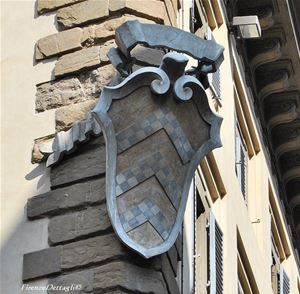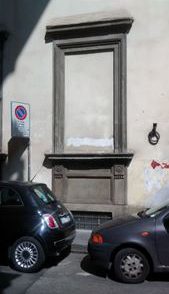Kamin Mohammadi’s family was forced to flee their home
country of Iran during the 1979 revolution, when she was just nine years old.
Now living between London and Tuscany, she has recently published her first
book, The Cypress Tree, a ‘love letter to Iran’ that brings to life the
characters, complicated history, joy and resilience of this beautiful country
and reconciles her often conflicting Iranian and British sides through a
literary journey that bridges the two.
It may seem strange that Italy proved the best place
to write a book about Iran, but Mohammadi first came to Florence to find a
retreat in which to work on The Cypress Tree. ‘I was struggling to write
the book in London. A friend offered me her flat in Florence for a few weeks,
so I packed up my life and came. I had never visited Florence before. I was
enchanted by the city. I loved the simplicity and enthusiasm: going to the
market every day and buying the most delicious produce for only a ‘tenner’;
having coffee at Caffé Cibrèo and Isidoro, the manager, calling out ‘Brava’
every time I lifted my pen. And being here gave me all of this lovely space to
write, not knowing anyone and not speaking a word of Italian. In those five
weeks, I wrote the same amount that I’d written in a year in London.’
As it has done to so many expats who planned to stay
here only a short period of time, Italy worked its magic on her and she never
left. Having lived most of her life in London, she finds Florence just perfect,
a small city with none of the stresses of the metropolis: ‘Oh, how sweet,’ she
says about Florentines, ‘They’re complaining about traffic! There are only
three cars!’ A few months after deciding to stay, she met her partner, Bernardo
Conti, the official photographer of Stefano Ricci, the Florentine luxury
menswear designer, and now lives with him, his three children and dozens of
dogs in the countryside near Rufina.
This year, she started to collaborate with Florence’s
annual Middle East Now Film Festival, which takes place in April, helping to
introduce Iranian filmmakers and artists to the organisers. ‘It’s a fantastic
festival-very contemporary, with everything from little animations to features
that make you laugh and documentaries that just rip the heart out of you.’
The Cypress Tree was published in the United Kingdom in 2011 (it will
be published in Italian by Piemme in 2013). Through her family’s stories,
Mohammadi seeks to educate people about Iran and Iranians. ‘All I’m trying to
do [with the book] is humanise. I think we all know, really, that we’re all the
same underneath. We all want to love our kids, fall in love, dance from joy,
have a roof over our heads, food in our bellies.’
‘Everybody has the same question on finding out I’m
from Iran. It doesn’t matter where in the world they are from. They all ask,
“If I went to Iran, as a woman, would I have to wear a headscarf?”‘
‘What this little piece of fabric symbolises for
people is oppression of women, but while we have an authoritarian and
patriarchal regime, Iranian women are probably better off than most of their
sisters in the Middle East. We got the vote in 1963, but in Saudi Arabia they
can’t even drive, let alone vote. Sixty-five percent of university graduates
are women as are 80 percent of civil servants and teachers. Women have long come
out of the home in Iran. My cousins are doing things in the Islamic Republic of
Iran that my mother, wearing miniskirts and going around in her beehive during
the Shah’s heyday, couldn’t dream of. There’s been a lot of evolution and this
little piece of fabric blinds us to that.’
‘It’s not our fault over here; we just don’t know.
Iran keeps it pretty tight. I’ve worked with brilliant journalists at the BBC
who’ve said things like “Oh, but of course women can’t own property in Iran.”
It’s the “Oh, but of course” that kills me. Why “but of course?” Because you
think Iran is Saudi Arabia, or the Iranian regime is the Taliban? It’s a
massive misconception.’
Mohammadi has not been back to Iran for six years, but
she has found surprising similarities between her native country and her
adopted one. ‘Italy is Iran, basically. Italy has the mafia, we have the
mullahs. There’s the crazy, chaotic Iranian in me that totally loves this
country because it’s like that, too. Even our ta’arof-an elaborate and
complicated system of courtesy-has a version here. Italians call it la bella
figura. And the warmth and humanity of the Italians is very Iranian, too.
Those things I find very familiar.’
Mohammadi has a second book in the works, another one
about Iran but very different from her last. ‘I’m going to write a novel about
life right now in Iran, today, in the twenty-first century. I want it to be
about a boy and a girl and a love affair because there’s nothing better than
sex to illustrate modernity!’
FLORENCE QUICKFIRE
When you have guests, where do you
like to take them?
A night-time tour of Florence by car.
Favourite thing about Florence?
San Miniato. It’s not only beautiful
but it also opens my heart.
Favourite place to get a cappuccino?
Undisputedly Florence’s best coffee
is at Caffé Cibrèo in Sant’Ambrogio.
One thing the United Kingdom will
always do better?
Civility; street fashion;
eccentricity; individuality; multiculturalism.
One thing Iran will always do better?
Passion; poetry; good manners!
One thing Florentines will always do
better?
Style; beauty; enthusiasm;
flirtation!
One thing you’ll never get used to
about Italy?
Inefficiency and monoculturalism!
How have you changed by being in
Florence?
Although I don’t see it myself,
according to my friends I’ve become more stylish. Sometimes my bag and shoes
even match! I’ve also become a lot more relaxed, although I’m not sure my
partner, Bernardo, would agree!







